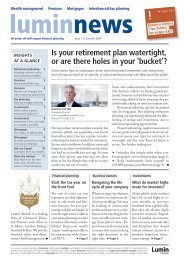lumin news Issue 10 / Winter 2024
Create successful ePaper yourself
Turn your PDF publications into a flip-book with our unique Google optimized e-Paper software.
<strong>lumin</strong> <strong>news</strong> <strong>10</strong> / winter <strong>2024</strong> Page 9<br />
You don’t have to sell investments<br />
to fund a property purchase<br />
Certain lenders lend against notional investment income/values, allowing you to keep<br />
investments intact, while helping children or grandchildren onto the property ladder.<br />
Affordability can often be an<br />
issue for investors who are<br />
seeking to fund a house purchase.<br />
But certain lenders will<br />
lend against the value of existing<br />
investments, or the value<br />
of future investment income<br />
that could be generated. In this<br />
scenario the property is the<br />
security, rather than the investment<br />
portfolio. This notional<br />
investment ‘income’ can<br />
help borrowers to bridge the<br />
income gap and get a loan.<br />
Advantages<br />
This can be an ideal solution<br />
for helping children and /or<br />
grandchildren onto the property<br />
ladder. It allows you to<br />
keep investments where they<br />
are, and benefit from potential<br />
returns, rather than selling<br />
off a portion of your assets<br />
to help fund a house<br />
purchase. Some lenders will<br />
lend well past retirement age,<br />
providing additional flexibility<br />
for those at later life stages.<br />
How does it work?<br />
Each lender’s terms will vary.<br />
Some may use a notional<br />
amount – for example 5% of<br />
the investment value – as income,<br />
irrespective of whether<br />
your investments are returning<br />
that amount annually, or<br />
being drawn. In the example<br />
(right) an 80% value is applied<br />
to investments worth<br />
£1,000,000, with the notional<br />
annual income value<br />
ranging from £25,000 to<br />
£80,000 depending on the<br />
lender and borrower’s age.<br />
Potential limitations<br />
Each lender will have different<br />
requirements, but typical<br />
caveats to consider include<br />
term lengths, which can be<br />
limited to a set maximum<br />
term. Lenders may also require<br />
a substantial minimum<br />
investment value. In certain<br />
cases this could be upwards<br />
of £250,000. Certain higher-risk<br />
funds or products may<br />
be discounted.<br />
Mortgage<br />
affordability with<br />
investment income<br />
Illustrative example<br />
£1,000,000<br />
£800,000<br />
£600,000<br />
£400,000<br />
£200,000<br />
£0<br />
Investment portfolio<br />
Notional income value 1<br />
1 £25,000 – £80,000; notional<br />
income value depends on the<br />
lender and the borrower’s age.<br />
If you would like to<br />
find out more about<br />
borrowing with investments<br />
please get in touch with our<br />
in-house mortgage experts<br />
on 03300 564 446.<br />
orange<br />
blau<br />
Funding the cost of school fees by remortgaging<br />
Over the past few years we<br />
have seen an increasing number<br />
of borrowers look to raise<br />
funds against their homes in<br />
order to pay school fees. This<br />
trend comes as the cost of<br />
private education has continued<br />
to rise.<br />
Funding the cost of<br />
private education<br />
Typically this is done by remortgaging<br />
and borrowing a<br />
larger sum (although occasionally<br />
taking out a second<br />
mortgage may be an appropriate<br />
solution). Often the<br />
amount raised can cover expected<br />
costs right up until<br />
the last child in the family<br />
leaves higher education. This<br />
can provide a valuable revenue<br />
stream to cover fees and<br />
help with affordability.<br />
Lender problems when<br />
remortgaging<br />
A specialist mortgage broker<br />
can provide access to lenders<br />
who will ignore the school fee<br />
commitment, in the knowledge<br />
that the capital raised is<br />
specifically for covering this<br />
expense. In many cases lenders<br />
count the school fees cost<br />
as an additional financial<br />
commitment, on top of the<br />
cost of the increased mortgage.<br />
This could mean that<br />
borrowers fail to meet a lender’s<br />
affordability criteria in<br />
some cases.<br />
Offset mortgages<br />
Some schools may offer a<br />
discount on the total cost if<br />
you pay the whole sum up<br />
front. If parents prefer to<br />
hold back the funds and pay<br />
school fees on a termly basis,<br />
remortgaging via an offset<br />
mortgage may be an appropriate<br />
solution. With an offset<br />
mortgage funds can be<br />
drawn as and when they are<br />
required. This provides flexibility<br />
and can be cost-effective,<br />
as interest is effectively<br />
only charged as and when the<br />
funds are spent.<br />
While offset mortgages<br />
provide valuable flexibility,<br />
interest rates can often be<br />
higher than for traditional<br />
mortgages. A specialist broker<br />
can help you find the best<br />
deal for your circumstances.<br />
Our independent inhouse<br />
mortgage experts<br />
have access to exclusive<br />
lender deals and provide a<br />
‘whole-of-market’ brokering<br />
service that covers all types of<br />
property finance, including<br />
offset mortgages. Call 03300<br />
564 446 to find out more.<br />
Important: It’s necessary to<br />
think carefully before securing<br />
other debts against your<br />
home. Your home may be<br />
repossessed if you don’t keep<br />
up with repayments on your<br />
mortgage.
















